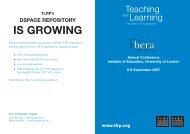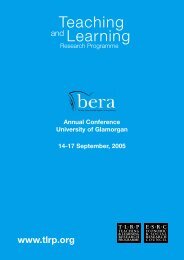Issue 2: the qualitative foundation of quantity - Teaching and ...
Issue 2: the qualitative foundation of quantity - Teaching and ...
Issue 2: the qualitative foundation of quantity - Teaching and ...
Create successful ePaper yourself
Turn your PDF publications into a flip-book with our unique Google optimized e-Paper software.
(Continued from page 6)<br />
can be conceptualized as one <strong>of</strong><br />
consolidation ra<strong>the</strong>r than revolutionary<br />
change. In this period <strong>the</strong> demarcation<br />
between anthropological<br />
<strong>and</strong> sociological work in education<br />
remained stark. In <strong>the</strong> US <strong>and</strong> Canada,<br />
anthropological work on race<br />
<strong>and</strong> culture continued to dominate.<br />
In <strong>the</strong> UK, (<strong>and</strong> Australia) social<br />
class remained a key preoccupation<br />
(Ball 1981, Connell 1985). During<br />
this time <strong>of</strong> substantial <strong>qualitative</strong><br />
work some scholars also began a<br />
critique <strong>of</strong> (<strong>qualitative</strong>) educational<br />
research. For example Becker<br />
(1971), an American sociologist,<br />
Wolcott (1981), an American anthropologist<br />
<strong>and</strong> Young (1971) a<br />
British sociologist, all argued that<br />
researchers were taking too many<br />
features <strong>of</strong> schooling for granted.<br />
The more recent history <strong>of</strong> <strong>qualitative</strong><br />
educational research, however,<br />
bears little relation to <strong>the</strong> recent moments<br />
articulated by Denzin <strong>and</strong><br />
Lincoln. Response to <strong>the</strong> crises <strong>of</strong><br />
representation <strong>and</strong> legitimation<br />
within <strong>qualitative</strong> educational research<br />
has been slow <strong>and</strong> uneven.<br />
The majority <strong>of</strong> <strong>qualitative</strong> educational<br />
researchers have failed to engage<br />
with debates about analysis,<br />
writing <strong>and</strong> <strong>the</strong> position <strong>of</strong> <strong>the</strong> researcher<br />
in <strong>the</strong> research process<br />
(an exception to this is Fordham<br />
1996). Few have responded with<br />
technological, analytical or representational<br />
innovation. There has<br />
been no volume <strong>of</strong> educational research<br />
essays that addresses <strong>the</strong><br />
issues raised by Clifford <strong>and</strong> Marcus<br />
<strong>and</strong> no edited collections in<br />
which <strong>qualitative</strong> researchers reflect<br />
upon educational texts. Equally <strong>the</strong><br />
various collections <strong>of</strong> papers that<br />
have been inspired or provoked by<br />
Clifford <strong>and</strong> Marcus (see for example<br />
James et al 1997, Behar <strong>and</strong><br />
Gordon 1995) do not contain contributions<br />
from <strong>qualitative</strong> educational<br />
researchers.<br />
There have been many educational<br />
ethnographies published since<br />
1986, a fact that recognizes <strong>the</strong><br />
relatively recent growth <strong>of</strong> <strong>qualitative</strong><br />
approaches within <strong>the</strong> discipline.<br />
However, very few <strong>of</strong> <strong>the</strong>se<br />
have shown signs <strong>of</strong> critical engagement<br />
with <strong>the</strong> fourth, fifth, sixth<br />
or seventh moments. Indeed <strong>qualitative</strong><br />
research in education has<br />
shown a remarkable stability <strong>of</strong><br />
form (not to mention topic area), in<br />
spite <strong>of</strong> <strong>the</strong> methodological <strong>and</strong><br />
epistemological debates that have<br />
ensued within <strong>qualitative</strong> research<br />
more generally. This is in contrast<br />
to o<strong>the</strong>r empirical areas such as<br />
science, medicine <strong>and</strong> social welfare,<br />
where textual <strong>and</strong> analytical<br />
innovations have taken place. This<br />
failure to respond is not just a failure<br />
to respond to innovative texts.<br />
Perhaps more worryingly it signifies<br />
a failure to address <strong>the</strong> debates<br />
about data collection, data analysis<br />
<strong>and</strong> <strong>the</strong> authority <strong>of</strong> researchers/<br />
texts that have inspired <strong>the</strong>se new<br />
developments.<br />
In conclusion <strong>the</strong>n it is important to<br />
note that <strong>qualitative</strong> research in<br />
education is now firmly established<br />
<strong>and</strong> indeed has made a valuable<br />
contribution to our underst<strong>and</strong>ing <strong>of</strong><br />
educational processes, institutions<br />
<strong>and</strong> practices. However, in many<br />
ways such research has failed to<br />
respond to <strong>the</strong> debates, innovations<br />
<strong>and</strong> developments that have been<br />
taking place among <strong>qualitative</strong><br />
scholars more generally. These developments<br />
have addressed a set<br />
<strong>of</strong> critiques that have also been levelled<br />
at <strong>qualitative</strong> research from<br />
‘outside’ – <strong>the</strong> nature <strong>of</strong> evidence,<br />
<strong>the</strong> authority <strong>of</strong> <strong>the</strong> researcher <strong>and</strong><br />
<strong>the</strong> text, ethical <strong>and</strong> political<br />
stances, <strong>the</strong> possibilities for generalization,<br />
<strong>and</strong> <strong>the</strong> role <strong>of</strong> <strong>the</strong> self in<br />
<strong>the</strong> research process. The conclusion<br />
from those working within<br />
<strong>qualitative</strong> approaches, though, has<br />
not been <strong>the</strong> dismissal out-<strong>of</strong>-h<strong>and</strong><br />
<strong>of</strong> <strong>qualitative</strong> approaches <strong>and</strong> methodologies,<br />
or a revision<br />
(downgrading) <strong>of</strong> <strong>the</strong> value <strong>of</strong> <strong>qualitative</strong><br />
data. Ra<strong>the</strong>r <strong>the</strong>re have been<br />
calls for a more critical, selfconscious,<br />
reflexive <strong>and</strong> innovative<br />
social science. If we are to enhance<br />
<strong>the</strong> capacity <strong>of</strong> <strong>qualitative</strong> research<br />
within education <strong>the</strong>re needs to be<br />
a more critical engagement with<br />
<strong>the</strong>se debates from within <strong>the</strong> research<br />
community. Moreover a<br />
case could be made that <strong>the</strong>se issues<br />
– for example <strong>of</strong> authority,<br />
Qualitative research in education<br />
representation, legitimacy <strong>and</strong> positionality<br />
(if not <strong>the</strong> solutions that<br />
some <strong>qualitative</strong> researchers have<br />
invoked) should be central considerations<br />
for all educational researchers,<br />
<strong>and</strong> not just for those<br />
who favour <strong>qualitative</strong> methods.<br />
For those who wish to engage fur<strong>the</strong>r<br />
with <strong>the</strong> debates <strong>and</strong> developments<br />
introduced in this paper <strong>the</strong><br />
second edition <strong>of</strong> <strong>the</strong> H<strong>and</strong>book <strong>of</strong><br />
Qualitative Research (Denzin <strong>and</strong><br />
Lincoln 2000) is a good place to<br />
start. The H<strong>and</strong>book <strong>of</strong> Ethnography<br />
(Atkinson et al 2001) has a<br />
specific chapter on <strong>qualitative</strong> research<br />
within education, as well as<br />
a number <strong>of</strong> chapters on issues <strong>of</strong><br />
analysis <strong>and</strong> representation. There<br />
have also been attempts to develop<br />
a genre <strong>of</strong> educational research<br />
that is more responsive to calls for<br />
new forms <strong>and</strong> textual practices.<br />
This is, perhaps, most visible in <strong>the</strong><br />
international journal Qualitative<br />
Studies in Education (QSE)<br />
References<br />
Atkinson P <strong>and</strong> C<strong>of</strong>fey A (1995) Realism<br />
<strong>and</strong> its discontents: <strong>the</strong> crisis<br />
<strong>of</strong> cultural representation in ethnographic<br />
texts, in B Adam <strong>and</strong><br />
S Allen (eds) Theorising Culture.<br />
London: UCL Press. pp. 103-39<br />
Atkinson P, C<strong>of</strong>fey A, Delamont S,<br />
L<strong>of</strong>l<strong>and</strong> J <strong>and</strong> L<strong>of</strong>l<strong>and</strong> L (eds)<br />
(2001) H<strong>and</strong>book <strong>of</strong> Ethnography.<br />
London: Sage<br />
Atkinson P, Delamont S <strong>and</strong> Hammersley<br />
M (1988) Qualitative research<br />
traditions, Review <strong>of</strong><br />
Educational Research 38(2):<br />
231-50<br />
Ball S (1981) Beachside Comprehensive<br />
Cambridge: Cambridge University<br />
Press<br />
Becker H S (1971) Footnote, added to<br />
M. Wax <strong>and</strong> R Wax (1971) Great<br />
tradition, little tradition <strong>and</strong> formal<br />
education, in M Wax (ed)<br />
Anthropological Perspectives in<br />
Education. New York: Basic<br />
Books pp. 2-27<br />
Behar R <strong>and</strong> Gordon D (eds)(1995)<br />
Women Writing Culture. Los Angeles:<br />
University <strong>of</strong> California<br />
Press<br />
Burgess R. G (1984) In <strong>the</strong> Field. London:<br />
Allen <strong>and</strong> Unwin<br />
Clifford J <strong>and</strong> Marcus G. E (eds) (1986)<br />
Writing Culture. Berkeley: Uni-<br />
(Continued on page 8)<br />
April 2002 Building Research Capacity 7

















